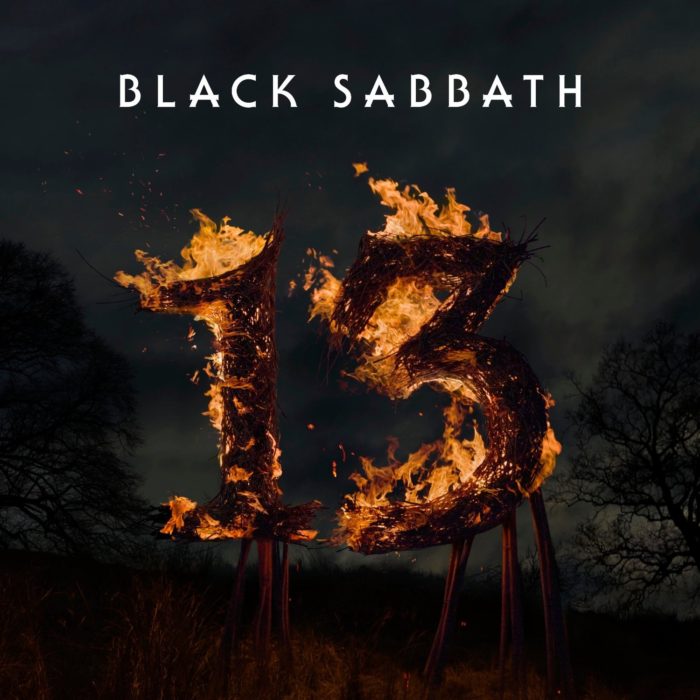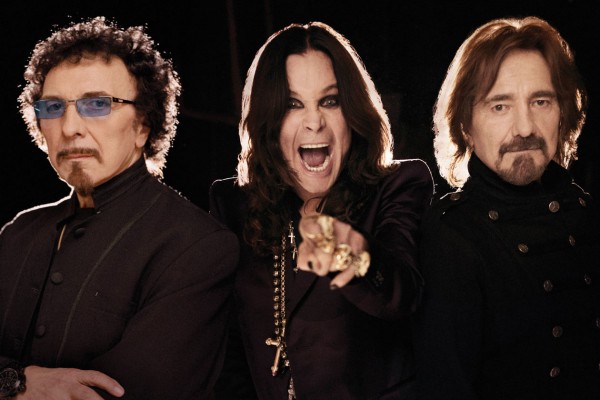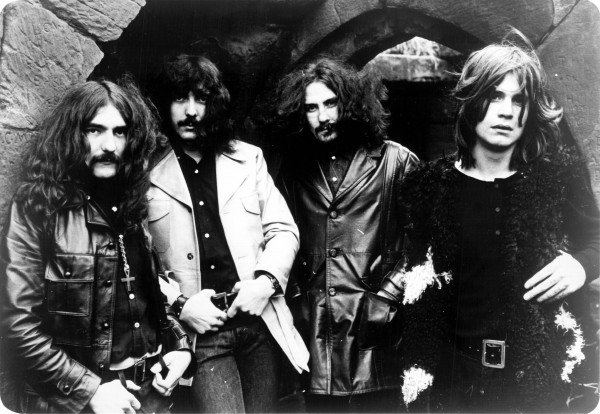Black Sabbath’s new album, 13, is a marvel. The first single “God Is Dead?” didn’t adequately prepare me for the experience of the whole work. This album contrasts the old sound and the new sound. The band frequently harkens back to their former work. I’ll note these instances when I treat the individual songs later in the review. In fact, some fans think 13 is too much like the earlier material. But they’re wrong. Surely we want them to recapture their earlier sound to some degree, but this album does much more than that. While surely somewhat nostalgic, this album does NOT fling itself into the market as a refurbished rehashing of used riffs. It’s a GREAT album. The original vibe remains as strong as ever. Fans agree and have propelled this album to #1 on the charts.
Let’s just talk about the players for a minute. Black Sabbath-for better or worse-always rests on the genius of guitarist extraordinaire, Tony Iommi. He has lost NOTHING on this album. He includes riffs and architectonic elements from ALL of his work with Black Sabbath, his recent work with Heaven and Hell, his solo albums, and perhaps even some of the blues roots that preceded Black Sabbath. His solos are as good as, or better than, his earlier work. When they do echo earlier compositions, they echo the very best soloing of his career.
Geezer Butler also plays as well here as he ever has, and a fan would do well to find anything on an earlier Sabbath album any better than his work here. Tony and Geezer seem to be playing for posterity. The lyrics of the entire album hint at the band’s contemplation of their own mortality, and surely Dio’s passing and Tony’s own illness make that inevitable. Ozzy Osbourne sounds pretty strong. His voice gets stronger as the album progresses, and some of the vocal melodies capture an Ozzy Osbourne solo sound — which was already developing on Never Say Die! (1978) back in the day. The synergy that made Black Sabbath a revolutionary band still exists in these three guys.
Brad Wilk’s drumming rounds out the record. The fan base made its displeasure at Bill’s absence very clear. Brad had a very big job trying to fill Bill Ward’s shoes. To his credit, he filled them well. We don’t hear the Butler/Ward swing anywhere on this record. Nor should we. Trying to imitate Bill would have been insulting. Brad did the job well, and he gets a big thumb’s up from this reviewer. All of these musicians in top form.
Musically, this album is VERY heavy in places. As mentioned, several of Tony’s solos equal anything he’s done so far, and his riffing remains the best there is. Lyrically, the darkness of this album stands with anything the band has ever done. The Grim Reaper peers over the horizon in nearly every song, and the tension between God and Satan (or at least the tension between the concepts of good and evil) emerges explicitly many times, as it did in their early work, when even the band were frightened by their own songs!
This review will address only the album proper, no bonus tracks. I may get an argument or two from some fans, but in general, I’ll say that the bonus tracks fail to achieve the same quality as the songs on the album. Perhaps more to the point, they do not “fit” the mood of the album proper.
“The End of the Beginning” strikes me as the perfect title for the first track of this album. The return of the Ozzy-era line-up marks a new beginning for these elder statesmen of heavy metal. The main body of the song pays homage to the first Black Sabbath song “Black Sabbath” off the album Black Sabbath (1970). This song reflects Tony Iommi’s growth and range as a guitarist. The track opens with a heavy, doomy march of separated chords similar to “Shadow of the Wind” (The Dio Years – 2006) or “Atom and Evil” off The Devil You Know — a rather recent development used here to great effect. There are tempo changes, and the classic break that we hear on the first four albums. Some listeners may remark that they use the same sort of break in four of eight songs on the album, thus leaving them repetitive and even self-derivative. I don’t agree, but I concede they lean on this approach. It’s a part of their style and fits.
He plays two solos, as we see in Dehumanizer’s (1992) “Computer God”, using the same basic architectonics. The solos themselves soar into prominence. The first, at 4:42 or so, lasts 50 seconds, and features not only a fantastic Iommi-style lead but also a tempo change into a bluesy sound at the end. The second solo closes the song, and for around 90 seconds grows in intensity, rising to an effort VERY similar to “Lonely Is the Word” from Heaven and Hell (1980). Again, we are not talking about a mimeograph album. Tony taps into EVERYTHING he’s done. And he plays with abandon, with emotion.
Lyrically, we see a fresh address of the theme Society vs. the Individual, especially in terms of the former controlling the latter. This theme has been interrogated throughout the entire history of the band, dealing with societal issues like family collapse in “Wicked World” off Black Sabbath, economics in “Cornucopia” (Vol. 4 – 1972), psychology in “Johnny Blade,” (Never Say Die!) television in “Zero the Hero” (Born Again – 1983) and the eponymous “Mob Rules” (1983) and “Computer God” ( both self-explanatory). This song updates for the pervasiveness of the simulacrum, urging the “Reanimation of your cybersonic soul” and concluding “You don’t want to be a robot ghost / Occupied inside a human host / Analyzed and cloned relentlessly / Synthesized until they set you free.” This eight-minute opus is pure Black Sabbath.
“God Is Dead?,” the first single, at almost nine minutes, seems like two songs. The first 4:00 or so offer a kinder, gentler sound. Then the chorus hits at 2:16 and at 2:26 that super-doomy descending lick hints at the Sabbath sound. Then they go back for the next verse. At 4:05 that Sabbath discord starts and at 4:09-4:10 Tony “shakes” the chord as only he does. Then a classic Iommi riff (4:17-4:18), a reprise of the aforementioned descending lick, and an expansion the power chords at 4:10 into back-and-forth riff, classic Black Sabbath-relentless, hypnotic. At 5:38 we get to the chorus with that descending lick again. Then at 5:48 they reprise the power chords from :30 into the song that form a bridge to the break at 6:19 that seems like something off the first album or Vol. 4 (or “Falling off the Edge of the World” off Mob Rules). Then at 6:27 Geezer Butler kicks it into high gear and never lets up. All the musicians do the same thing, classic Black Sabbath. Then Geezer starts what will be one of the best performances on bass guitar in the Black Sabbath oeuvre. Even when the song slows, his playing does not. The 15-second solo (7:38–7:53) has a bluesy, 60′s sound to it. Some listeners may have preferred a longer solo, but the musicianship and intensity so far have been so powerful that a solo isn’t needed for the song to have a high point. In fact, Geezer’s playing behind the solo almost equates with soloing itself as he’s playing much faster than Tony. The final minute is the descending lick behind repeated “God is dead” chorus. The chorus leaves us with a rather definitive statement “I don’t believe that God is dead.” The supremely dark lyrics offer the good vs. evil motif that this band has defined. These lines typify the questions asked in this song: “Nowhere to run / Nowhere to hide / Wondering if we will meet again on the other side / Do you believe a word / What the good book said? / Or is it just a holy fairy tale and god is dead?” Nothing says Black Sabbath like two songs in excess of eight minutes offering pessimism and plodding riffs. What a one-two punch!
“Loner” rocks: a flat-out, straight-ahead headbanger. Some say it reminds them of “N.I.B.” It actually recalls the basic riff pattern of the main riffs from “Black Oblivion” and “Flame On” from the 2000 solo album Iommi. Lyrically, the song speaks of isolation, and the head-banging groove of the song contrasts with the seriousness of the message, tied up in the final verse: “Communication’s an impossibility / His own best friend but he’s his own worst enemy / The secrets of his past locked deep inside his head / I wonder if he will be happy when he’s dead.” Perhaps one of the hallmarks of Black Sabbath and of the metal music they pioneered is an understanding of the angst — even depression – that their listeners experience. The strong of grounding in existentialism in their work makes even an up-tempo frolic cuts into the heart of the listener. The irony of the seriousness of the theme and the elation of the riff-similar in a way to “TV Crimes” off Dehumanizer bespeaks a long-standing Sabbath tradition as well.
“Zeitgeist” immediately reminds us of “Planet Caravan” off Paranoid. In a larger sense, perhaps the beauty of “Zeitgeist” is to recall Black Sabbath’s numerous slower and/or psychedelic tunes, such as the aforementioned, “Planet Caravan,” “Solitude” off Master of Reality, and admittedly, to a much lesser degree “Changes” off Vol. 4, “Spiral Architect” off Sabbath Bloody Sabbath (1973), “She’s Gone” off Technical Ecstasy (1976), and others off Dio-era albums. No innovation exists here vis-à-vis older Sabbath tunes of a similar nature. No doubt people will like this one-especially, perhaps, people who weren’t hardcore Sabbath fans. Unremarkable in comparison to the other songs on the album, it provides a break in the heaviness — much as the other songs noted here did for those albums — this song reminds us that Black Sabbath did this too. Insofar as this album may well become a historical document, “Zeitgeist” proves a worthy inclusion.
The opening of “Age of Reason” sounds a bit like the opening of “Follow the Tears” off The Devil You Know. Another elaborately structured offering marked by numerous genre and tempo changes, reminiscent of “Dirty Women” off Technical Ecstasy, give this song an almost proggy feeling. The opening riff while really quite doom-laden, is also rather bluesy. While the structure and overall sound of the song unmistakably heralds Black Sabbath, the melody suggests Ozzy’s solo work (not to mention an echo of “Junior’s Eyes” off Never Say Die! which presaged the Ozzy Osbourne sound in many ways). The marvelous solo in this song recalls “Zero the Hero” a bit. Tony takes his time, and the solo carries us away as only an Iommi solo can. At the risk of being repetitive, Tony Iommi has lost nothing. The guitar work here stands up to anything he’s done. Similar to the general theme of “The End of the Beginning” and many other Black Sabbath songs, the lyrics describe a hopelessness accepted by people who have lost their will to be themselves: “Sustainable extinction / A fractured human race / A jaded revolution / Disappears without a trace.”
The opening progression of “Live Forever” bears a similarity to the opening of “Lord of this World” off Master of Reality (with, again, a touch of that march of separated chords noted in “The End of the Beginning”) and then steps up the tempo to a riff strikingly similar to the up-tempo movement of “Cornucopia” off Vol. 4. This one really harkens back to the older groove. Even Brad’s use of cymbals seems rather Bill Ward-esque. While clearly adapting these older tunes, the nuanced use of the newer aesthetic and burnished sound of excellent production renders it a new song. Ozzy sings as only he can-with all the soaring menace of that same era. The lyrics of the song sustain the motif of aging and the looming presence of impending death. This song lacks the depth of the others on this album. For instance, the closing lines, “I may be dreaming or whatever / Watching my life go by / And I don’t wanna live forever / But I don’t wanna die!” certainly do not rise to the more profound, sometimes poetic, expression of the same uneasiness. I’ll neither label this song as filler nor dispute the inaccuracy of said label.
“Damaged Soul” is monumental. Clearly a tribute to their roots in the blues, this song amalgamates everything Black Sabbath not only does, but can do. Black Sabbath has made forays into the blues before, notable on the Seventh Star (1986) and the song “Dying for Love” off Cross Purposes proves a stunning blues song. But Sabbath hasn’t done this anywhere else. My first thought upon hearing it was that it sounds like Robin Trower, but heavier. There are moments in this song that sound like Electric Wizard. It almost demands a genre definition of “Doom-Blues.” Again, the soloing echoes “Lonely Is the Word.” The first solo at 3:49, lasts for about 45 seconds and never deviates from a standard blues structure. He means to play the blues here. Then at 5:26 we get another 30 seconds or so until a break takes us to another tempo. The harmonica wails into this change, and then Tony returns at 6:36 and serves up a solo of his own. While the rest of the players play the blues (and Ozzy even sustains a fine harmonica riff), the exit solo is pure Iommi. Lyrically, this may be the darkest song on this album and in the running for the darkest song they’ve ever made. Lyrically, the song calls up the career-long (or age-old?) subject of possession and reprises this album’s motif of impending death and the tension between good and evil: “I don’t mind dying ’cause I’m already dead / Pray not for the living; I’ll live in your head / Dying is easy; it’s living that’s hard / I’m losing the battle between Satan and God.”
“Dear Father” proves an indictment of Catholic Church’s priest sexual abuse tragedy, every bit as scathing and pessimistic an attack on this issue as “Wicked World,” “War Pigs” off Paranoid, or “Into the Void” off Master of Reality.” This song boasts a rather complex overall structure, featuring multiple tempo and style changes. But nothing in this song equals the rest of the album, musically. The reason for this appears to be that the band wants us to listen to the words. An album this good, with Tony and Geezer playing as well as they have ever played, with Tony playing his heart out in more than one place, would not forgo a solo without a reason. That reason must be to focus our attention on the message. The music changes every time the message changes, intensifying the merciless dissection of those merciless crimes. The closing lyrics sum up the song with perfect clarity: “Dear father forsaken, you knew what you were doing / In silence your violence has left my life in ruin.” The song closes with a repeating “In ruin, yeah” phrase, symbolizing the vile and on-going suffering caused by these atrocities. After this song ends, the rain sound effect from the beginning of the first album fades in for a few seconds, reminding us that this album not only provides a resurrection of the original line-up and sound but also offers a vital viewpoint on religion and music, contemporary issues and timeless questions.
In 13, Black Sabbath reflects both the original Black Sabbath sound, imagery, and philosophy and the influences of all their musical experience from their solo work, other incarnations of Black Sabbath, and their inherent genius. They recast the system of rock music 43 years ago, and in this “reanimation of the sequence,” they have again recast the system.
2 CommentsTags: 13, black sabbath, Doom Metal, geezer butler, Heavy Metal, ozzy osbourne, proto-metal, review, tony iommi



 I’ve been listening to “God Is Dead?”-the first single off Black Sabbath’s new album 13, since yesterday. It’s really good and really Sabbath. I’m obsessing. And maybe I’m a rabid fan who’s lain in wait and whose enthusiasm has gotten the better of him. But this is enlivening me in the way only music can. So, I’m going to return the favor and Analyze It to Life.
I’ve been listening to “God Is Dead?”-the first single off Black Sabbath’s new album 13, since yesterday. It’s really good and really Sabbath. I’m obsessing. And maybe I’m a rabid fan who’s lain in wait and whose enthusiasm has gotten the better of him. But this is enlivening me in the way only music can. So, I’m going to return the favor and Analyze It to Life.
